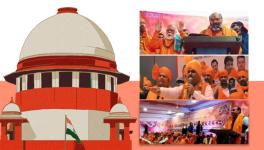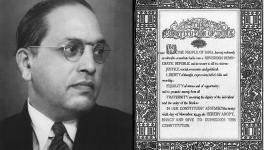Supreme Court Strikes Down Policy of Excluding the Reserved Community From Competing for General and Open Category

Image Courtesy: Jagran
The Supreme Court has rejected a policy of UP regarding reservation and said that selection of candidates with less merit than other candidates for open/general category vacancies was incongruous with the “very basic principles which have all the while been accepted by this court”. It said it will lead to irrational results where more meritorious candidates may get sidelined and it was completely opposed to the long line of decisions of the Court, writes P PUNEETH.
——-
THE decision of a three-judge bench of the Supreme Court in Saurav Yadav v. State of Uttar Pradesh on December 18, 2020, dismantled the covert design of turning the idea of reservation for weaker sections on its head.
Uttar Pradesh had adopted a policy to disallow female candidates belonging to any reserved category – SC, ST or OBC – from competing for vacancies reserved for the fairer sex under the general/open category. The said policy was under challenge before the Supreme Court. The specific issue in the case relates to “horizontal reservations”.
Constable Posts
Two women candidates belonging to reserved communities had approached the Supreme Court under Article 32, challenging the selection process conducted in 2013 for filling up the posts of constables in the UP Police. Later, many other candidates got themselves impleaded in the proceedings. Their contention was that even though they had secured higher marks than the cut-off fixed for the general category women, they have not been selected and those with lesser marks from non-reserved categories were chosen.
Also Read: Unfolding the Enigma of Reservation
During the hearing, it was admitted by UP that at least 21 candidates belonging to the OBC category had secured more than the cut-off marks fixed for the general/open category, but they have not been selected. This, it said, was because the quota for female (general or open category) was reserved for only candidates not belonging to any category entitled for vertical reservation.
Two women candidates belonging to reserved communities had approached the Supreme Court under Article 32, challenging the selection process conducted in 2013 for filling up the posts of constables in the UP Police.
It is commonsensical that horizontal reservation for female (general/open) category should be open for all female candidates unlike the quota earmarked for the women belonging to SC, ST or OBC category as it is a case of “interlocking reservations” – where “horizontal reservations” cut across “vertical reservations”.
Horizontal vs Vertical Reservations
It may be apposite to point out here that all reservations provided under the Constitution are not of the same nature. Reservations provided to certain social categories viz., SCs, STs and OBCs have been ordinarily referred to as ‘vertical reservations’ and the reservations provided to certain special categories viz., women, ex-service persons, sportspersons, differently-abled and project displaced persons etc., have been referred to as ‘horizontal reservations.’ Suffice it to mention here, without elaborating, that principles applicable to both are different.
Also Read: OBC Reservations: Investigating caste, backwardness and representation
In UP, the policy of not allowing candidates belonging to the SC, ST or OBC category to compete for vacancies in the general/open category was applied only in the case of vacancies horizontally reserved for female candidates and not in the case of male ones who are entitled only for vertical reservation.
During the hearing, it was admitted by UP that at least 21 candidates belonging to the OBC category had secured more than the cut-off marks fixed for the general/open category, but they have not been selected. This, it said, was because the quota for female (general/open category) was reserved for only candidates not belonging to any category entitled for vertical reservation.
Male candidates entitled for vertical reservation were allowed to compete for vacancies in the general or open category since the law in this regard is well settled by the apex court in Indra Sawhney (1992), R. K. Sabharwal (1995), Rajesh Kumar Daria (2007) and other cases.
Until now, the specific question of whether female candidates belonging to any of the vertically reserved categories can be selected on “merit” against the vacancies horizontally reserved for general/open category was a res integra before the Supreme Court. The question, of course, had come up before different high courts in the past.
The high courts of Rajasthan, Bombay, Uttarkhand and Gujarat had answered it in the affirmative, whereas those of Allahabad and Madhya Pradesh answered it in negative. The latter permitted selection for vacancies in the open/general category of those candidates with less “merit” than those left out.

Court Rejection
The three-judge bench of the Supreme Court in Saurav Yadav had unanimously and categorically rejected the view adopted by them and opined that selection of candidates with less merit than other available candidates for open/general category vacancies was incongruous with the “very basic principles which have all the while been accepted by this court”.
What is important to be noted is the emphatic observation made by Justice U.U. Lalit. He said that the view adopted by the high courts of Allahabad and Madhya Pradesh “will thus not only lead to irrational results where more meritorious candidates may possibly get sidelined as indicated above but will, of necessity, result in acceptance of a postulate that Open or General seats are reserved for candidates other than those coming from vertical reservation categories. Such a view will be completely opposed to the long line of decisions of this Court.”
Justice U.U. Lalit said that the view adopted by the high courts of Allahabad and Madhya Pradesh “will thus not only lead to irrational results where more meritorious candidates may possibly get sidelined as indicated above but will, of necessity, result in acceptance of a postulate that Open / General seats are reserved for candidates other than those coming from vertical reservation categories.”
This has, in a way, put an end to the demand often raised by some opponents of the reservation policy that vacancies in the general/open category shall be filled up only by the candidates belonging to non-reserved categories notwithstanding “merit”. In effect, this is a demand, which can more appropriately be called: “reverse reservation”. If this is allowed, “open category” vacancies are no longer “open” to all, but reserved for those who are not belonging to any of the reserved categories.
Absurd Demands
Since such a demand is often raised, it is important to stress some of its absurdities. Firstly, the opponents of reservation oppose it on the ground that it undermines “merit”. When they demand reverse reservation, per contra, they do not mind “merit” being undermined. In the present case, the Supreme Court addressed the issue relating to merit and explicitly stated that “[S]ubject to any permissible reservations i.e.either Social (Vertical) or Special (Horizontal), opportunities to public employment and selection of candidates must purely be based on merit. Any selection which results in candidates getting selected against Open/General category with less merit than the other available candidates will certainly be opposed to principles of equality.”
Also Read: Treating Unequals as Equals: Can SCs and STs be sub-categorised?
It is pertinent to point out that even reservation does not completely undermine merit. Selections to reserved vacancies are made on the basis of inter-se merit (i.e., meritorious ones among those belonging to a particular reserved community are selected), whereas those to the open/general category vacancies are made on the basis of general merit. Emphasis on the inter – se merit, in the former case, is to neutralise the privileges of pedigree.
Secondly, if the open category is to be treated as reserved for non-reserved (other than SC, ST or OBC), then it would amount to 100% reservation, which was disapproved by the Supreme Court as early as 1951 in Champakam Dorairajan.
It is pertinent to point out that even reservation does not completely undermine merit. Selections to reserved vacancies are made on the basis of inter-se merit, whereas those to the open/general category vacancies are made on the basis of general merit.
Thirdly, the outer limit of vertical reservations for SCs, STs and OBCs together, as mandated by the Supreme Court, shall not exceed 50%. Though some states have exceeded this limit (they are under challenge), many strictly follow it. It is not a proportionate reservation. As per the estimates in the NSSO Sixty-first Round Report on “Employment and Unemployment Situation among Social Groups in India” (2004 – 2005), their population in the country is 69.16% (OBCs: 40.94%; SCs: 19.59%, and STs: 8.63%). If they are not allowed to compete for the open/general category vacancies, then 69.16% of the population will have to compete for only 50% of vacancies, whereas the remaining 30.84% would have reverse reservation for remaining 50% of the vacancies.
In some states, the population of SCs, STs and OBCs is higher than the national average. One can imagine the outcomes in such states. As there is no official data on the percentage of creamy layers among OBCs, it is not clear whether their exclusion would make any substantial difference.
EWS Reservation
With the introduction of Economically Weaker Sections (EWS) reservation, the outer limit of vertical reservation has been extended to 60%. As there is no estimation of the percentage of the population entitled for EWS reservation, even if one assumes it to be around 10%, then around 80% (in some states it could be even more) of the population would be competing for 60% vacancies and the remaining 20% would have 40% of the vacancies reversely reserved for them.
In such a scenario, the reservation policy suits the non-reserved better than the reserved. That would be an affront of the very idea of affirmative action for the emancipation of the weaker sections. Such a policy turns the idea of reservation on its head.
(P. Puneeth is an Associate Professor of Law at the Centre for the Study of Law and Governance, JNU, Delhi. The views are personal).
The article was originally published in The Leaflet.
Get the latest reports & analysis with people's perspective on Protests, movements & deep analytical videos, discussions of the current affairs in your Telegram app. Subscribe to NewsClick's Telegram channel & get Real-Time updates on stories, as they get published on our website.























